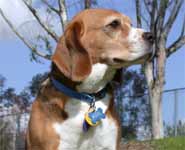The independent report, written by Dr Nicola Rooney, a research associate at the University of Bristol and Dr David Sargan, a senior lecturer at the University of Cambridge Veterinary School, concludes that exaggerated physical features and inherited diseases cause serious welfare problems in pedigree dogs.
Because each breed has its own problems there is unlikely to be one cure-all solution. However, the authors have suggested a number of possible ways forward. The four measures considered to be of greatest priority are:
- Systematic collection of data on the diseases all dogs suffer from and causes of death.
- Changes to current registration rules to prevent the registration of puppies born from the mating of close relatives.2
- Changes to current registration rules to allow new genetic material to be introduced into breeds. Currently a dog can only be registered with the Kennel Club if both its mother and father are registered members of that breed’s studbook.
- Monitoring of the effectiveness of any changes to breeding strategies.
Mark Evans, the RSPCA’s chief veterinary adviser, said: “I hope this independent report will be seen as a constructive contribution to the debate and that it stimulates discussion amongst everyone involved in order to identify practical, evidence-based solutions that really make a difference.
“The RSPCA recognises that finding remedies for the many problems facing pedigree dogs is a difficult, complex challenge. But that isn’t an excuse to shy away from it – the fact is pedigree dogs need our help and they need it now.”
Commissioned by the RSPCA, Pedigree Dog Breeding in the UK: A Major Welfare Concern? is a review of the relevant science and has been compiled by highly respected scientists, vets and dog welfare experts3 who also propose possible ways of improving pedigree dog welfare.
Steps are already being taken to carry out the recommendation deemed most urgent by the report authors – the systematic collection of data on inherited diseases suffered by dogs.
The RSPCA is working with the University of Sydney and the Royal Veterinary College on a three-year research project to create a new, electronic, system for collecting, analysing and reporting data on inherited disorders in both dogs and cats. When complete, for the first time in the UK there will be comprehensive data to show the prevalence of inherited disorders in specific breeds. This will allow the effectiveness of any new breeding initiatives to be monitored.
The RSPCA is extremely concerned about the unacceptably high levels of disability, deformity and hereditary disease affecting these animals, as is the public, following the BBC documentary Pedigree Dogs Exposed which sparked a national debate on the issue.
